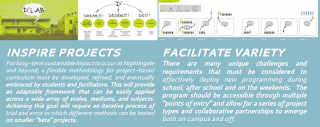I invite you to learn more about Nightingale Middle School and its D3 Lab
The work of Enrique Gonzalez and the New Learning Institute in NIGHTINGALE INITIATIVE is inspiring for schools that are face to face.
The school has a woodshop (most schools had a woodworking shop for students in the 1960s but now few schools have this facility now... )
Links to the video
Conversation part 1
Most young people don't believe that the school belongs to them.
We want the community to join us. The classroom is the extension of their living room.
A candid conversation about education, community and life with Enrique Gonzalez, Principal of Florence Nightingale Middle School in Los Angeles, California.
=========
Conversation part 2
Tour with Nancy Chou in the D3 Lab: Dream it, Design it, Do it. New Learning Institute
Interview with Erin Brest, a musician who graduated from Frida Kahlo High School.
=============
Conversation part 3
The students will put a smile on people's faces. They prepare to visit a local convalescent home. (Music)
The Night Hawk's Nest, made with discarded materials.
"The children have taken ownership of this area."
======
Conversation part 4
"Kids learn about safety and they can apply the skills that they learn from other subjects."
The kids are engaged here. We're preparing them to be citizens of the world.
Around us there is poverty and hunger, but the answer is in the schools, where they can develop their thinking.
Thanks to Elliot Washer, Nancy Chou and the staff at Nightingale middle School, who want us to become the best school in the nation. Let's be a model, here's an alternative, please consider it.
Fourth and final part of a candid conversation about education, community and life with Enrique Gonzalez, Principal of Florence Nightingale Middle School in Los Angeles, California.
Contact Enrique at exg0368@LAUSD.net
Explanation of the New Learning Institute's interest in Nightingale middle School in Los Angeles
Excerpt:
The Role of Design Thinking & Digital Media Tools
At the D3 Lab at Nightingale Middle School, students learn by doing. We ask them to solve a problem by first defining what the problem is. Students start outside of the space - in the school or in the community - where they ask critical questions that uncover real human needs they want to address. They then iterate to develop an unexpected range of possible solutions and create rough prototypes to take back out into the field to test and retest with real people. The final design is actualized at the school or in the community. The focal points throughout this process are reflection, action, and contribution.
38 MB report about the project






































